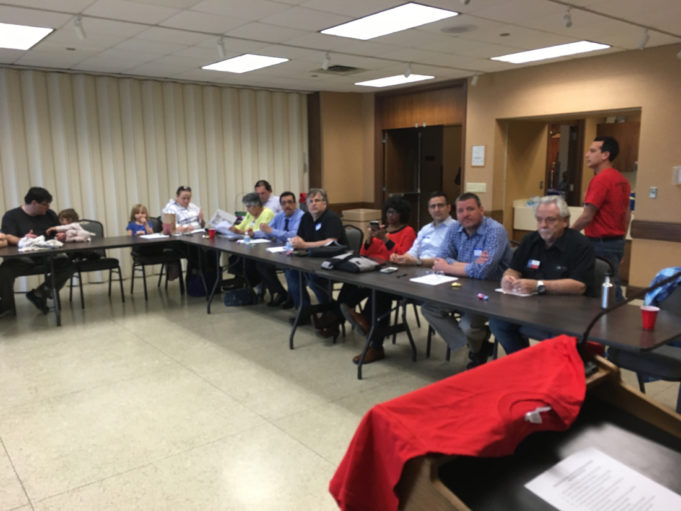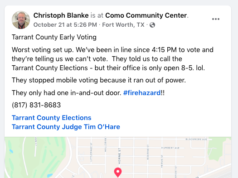Betsy Price took a $100,000 pay cut when she decided to become mayor in 2011. She had earned more than $1 million during her 10 years as tax assessor-collector (at an annual salary of $129,000 back then). Price sought election to the lower paying mayoral position because it offered a better platform to help improve the city she grew up in and loves, she told the Weekly during her first mayoral campaign.
A lot of residents might like to serve their city but can’t afford to live on an annual salary of $29,000 (mayor) or $25,000 (city council members).
On Saturday, May 7, Fort Worth residents have the chance to vote on a pay raise for the mayor and City Council. The proposal is one of many potential amendments to the city charter. Last July, Fort Worth City Council appointed a task force to recommend possible changes to Cowtown’s founding document. The charter has been updated every several years since 1924 but has not been revised since 1996.
Under the new measure, council member annual salaries would rise to $45,000, while the mayor stands to earn $60,000. Proponents of the increase say the mayor and council members spend 40 to 80 hours a week on city business and ought to be paid a living wage. Smart, capable, and potentially great city leaders can get left out of the loop because they’re too busy earning a living to spend up to 80 hours a week on city business. A council member working 40 hours a week is earning about $13 an hour.
If elected positions don’t pay a living wage, then only independently wealthy candidates will seek them (so the theory goes).
Fort Worth employment lawyer Jason Smith sees the societal problems (stress, poor health, depression) that occur when workers aren’t fairly compensated every day. He doesn’t have a problem with pay increases for City Council members and the mayor per se, he said. Many similarly sized cities across the country provide their mayor and council members $45,000 or more annually. But with 235 city employees making less than $10 an hour, including 21 making the hourly wage of $7.25, according to city chief financial officer Aaron Bovos, Smith wants to see the city help its lowest paid employees first.
“I think we should raise the minimum wage of employees at the city level to a fair wage before we haul off and raise the salaries of the folks at the top of the food chain,” Smith said.
Enter: FAIR Wage Fort Worth.
The new volunteer group works to provide all employees in Fort Worth a fair wage. Fair wage, like living wage, is an evolving moniker, but it commonly is defined as remuneration that allows for basic necessities like food and housing. For Fort Worth, Smith arrived at the $11-an-hour figure after consulting with an economist and noting that Dallas City Council approved a $10.62 minimum wage for its employees and city contractors last year.
To create awareness, Smith and his supporters are partnering with the Cesar Chavez Committee of Tarrant County, a nonprofit that promotes education, social justice, and community engagement, and North Texas Jobs with Justice, a nonprofit focused on workers’ rights.
In addition to an $11 minimum wage for city employees and contractors, the groups are asking the City Council to require any business receiving incentives from the city (tax breaks, rebates, and grants) to pay its employees a fair wage. San Marcos City Council implemented a similar measure in February, this one requiring businesses to pay $15 an hour in exchange for city incentives.
The group held its first meeting this week at the Fort Worth Botanic Garden. About 30 volunteers discussed how to proceed and listened to a professor of economics at the University of Texas at Arlington discuss the economic impact of increased minimum wages.
FAIR Wage Fort Worth volunteers plan to voice their proposals to the City Council in the coming weeks, Smith said. The group will also undertake a six-week campaign to spotlight the issue to residents through public events and social media. He hopes other groups will partner with him in the weeks leading up to the May 7 vote.
“I believe Fort Worth isn’t an extreme place” politically, he said. “I think most people can get behind a grassroots idea that will make our city better.”













I have to disagree, it will only inspire more increases, give a little take a lot. I don’t like the idea at all, and Fort Worth is about to turn into another corrupt Dallas if so, hide and watch. There is plenty of corruption already in Fort Worth, lets let the voters decide if anything, not those in charge.
Many of our Fort Worth citizens are practicing Christians Jimmy. Many citizens believe in equity and decency and treating others as we would like to be treated…don’t you know that? City workers need more pay to stay as stable as they were a year or two ago. You don’t need a lot of sense to realize that but you do require a heart and some normal sense of decency. You expect greed-head Peckerwoods and Tea-Bagging nut-balls to get into Heaven? What’s wrong with you? I’m a voter and I voted for our leaders to call the shots here…that’s the way it works. I have never seen one instance of Fort Worth Working Class citizens being overpaid, ever, never. What in the world is up with you? You’re smarter than you pretend. You should be repentant. You really should get right. I suggest you pray about it. What will Jesus say? You expect he’s a greed-head, Tea-bagging, peckerwood??? I got you on my prayer-list.